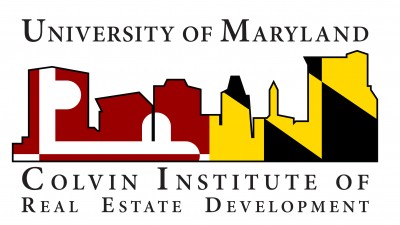10 Reasons to Get a Commercial Real Estate Advanced Degree

Once upon a time, commercial real estate was like 19th century law and architecture: you learned by joining a firm and working under the wing of a mentor. But in the last 15 years, advanced degrees of real estate development have come into their own--and the industry's loving grads with the foundational knowledge and skills that guarantee success. Whether you're thinking of going back to school or still at college, an advanced degree--like the one you can get at the University of Maryland's Colvin Institute of Real Estate Development--can set you apart from all your peers.
To learn more about this Bisnow partner, you can click here or email Margaret McFarland. You can also apply by clicking here.
Standing Apart in the Field
Saying the job market is crowded could be the understatement of the year. And with thousands of grads competing for jobs, a BA only takes you so far. In fact, many companies don't even factor in Bachelor's degrees these days, finding them incomparable to experience and knowledge. But an advance degree shows that you know your stuff, have worked in the field (to some degree, at least), giving you a huge leg up on the competition.
Better Networking Connections and Opportunities
Attending an university with a number of faculty active in the industry gives you a huge network once you graduate. In addition, a university that presents opportunities to engage with real estate on the ground will make you a significantly stronger candidate--especially when working a strong real estate market like the Washington/Baltimore region. Not only could you study post-industrial redevelopment in Baltimore and suburb repositioning in Tysons and Rockville, but you can also study a monumental city core and environmental issues.
Get Your Knowledge Base in a Systematic Manner.
Education's about instructors who are "hunter and gatherers" of knowledge. The best instructors organize the knowledge they find into an effective body, provide creative methods for you to access the material and help you practice what you know in homework and other assignments. While learning-by-doing without any systemic underpinnings has indeed worked in the past, a broad base of knowledge about the entire real estate industry--through education--is undeniably important to a complex and fast-growing industry. And rather than a solely transaction-based or finance-based learning experience, a great university looks at both the macro and micro factors that impact the industry, as well as the disciplines (such as asset and portfolio management, commercial leasing and brokerage and market analysis and valuation). And, of course, every student should know the two pillars of real estate: property law and fundamentals of real estate finance.
Enhanced Oral Communication Skills
Communication skills are paramount in the industry. Sure, you can talk, but can you communicate individually? In a group? Can you "pitch" your property or your project to owners, sellers, lenders, investors and so on? A strong program not only provides a strong real estate knowledge base, but also demands--and supports!--outstanding oral communication skills.
Enhance Business Writing Skills
Just like oral communication, most of us need practice, coaching and feedback (aka grades) to sharpen our writing skills. From grammar and syntax to style and length, superior writing skills will make you stand out and serve as a clear key to success.
Learning How to Undertake the High Risk/High Return Nature of Real Estate Development
If you're interested in the IPO part of the industry, a commercial real estate education is vital, whether it's asset management or raising equity. Even if you don't plan to take the high-risk road, knowing the risks and rewards of developing new products will enhance your career.
Learn How to Make a Difference
Many specialize in a particular field or asset type of real estate. A strong university like UMD can provide a multi-course sequence in retail, hospitality, international development and other fields. A four-course sequence in affordable housing or hospitality can teach you that what looks like a simple transaction could be the most complex around. By knowing the true natures of each property type, you can figure out how you can make the most significant impact when you enter the fray.
Make Connections with Your Peers
Reading a book will give you the raw knowledge, but there's no substitute for the shared venture of learning that you get in a classroom with peers. After all, they may one day be your future partners or peer mentors you'll need as you continue your career. The real estate world's smaller than you think.
Learn to Be Cooperative and Competitive
Real estate isn't a solo venture--it'll take one team or another to make a project a success--and learning to work in teams is a good foundation for workplace skills. At UMD, multidisciplinary group projects are super effective for preparing for success in the field. In fact, UMD has been to the Final Four of the ULI International Hines Real Estate Case Competition four times in the last eight years, winning the competition outright in 2014 and 2015. With their multidisciplinary approach, a key emphasis on creative urban design, sophisticated market analysis and financing and outstanding presentation skills, UMD's students are second to none.
A Variety of Programs

There are many different real estate programs across the country, which vary significantly when it comes to breadth of approach, the balance between skills and knowledge, the level of talent in your peers, the type of faculty and even the number of focuses provided (single or multidisciplinary). You'll need to determine for yourself which one is best for you, but regardless, a Master's degree will help jump start your knowledge, skill and career.










